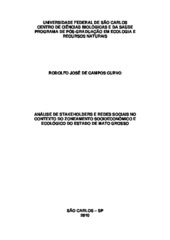Análise de stakeholders e redes sociais no contexto do zoneamento socioeconômico e ecológico do estado de Mato Grosso

Ver/
Fecha
2010-06-10Autor
Curvo, Rodolfo José de Campos
Metadatos
Mostrar el registro completo del ítemResumen
The design of law of Socio, Economic and Ecological Zoning of state of Mato Grosso - ZSEE / MT includes a technical and policy that directs the development and occupation of territory and regulating the use of natural resources, establishing different categories of human intervention in the environment state. This study aimed to evaluate and identify the actors (stakeholders), characterizing the conflicts, alliances and environmental demands in the context of ZSEE / MT. The approach outlined is qualitative, focusing on descriptive and exploratory, using documentary research and semi-structured interviews with 65 participants, containing a list of 7 questions in the application form in snowball for development of social networks, questioning the understanding of people and / or social groups on the theme, activities, partners and dominance of interests, conflicts, losses, benefits, demands and suggestions from the proposal ZSEE / MT. The data was written, recorded, transcribed, organized, analyzed, processed and specialized in Excel 2007 spreadsheets and UCINET 6.0. The research has a broad vision for the state of Mato Grosso and on a larger scale with reference to the place of the implementation of work groups and public hearings in the Pólos of Planning Diamantino, Tangará da Serra and Alta Floresta. As result the main highlights is identification and characterization of three definitive Stakeholders, two categories of Mercado e one in the Comunitário category that showed a higher degree of dominance of interests, influence and focus on clear analysis of the social network built. It is extremely important this study, given that there are many aspirations and realities around the ZSEE / MT to generate an infinite number of conflicts and environmental demands, which can be resolved and ease to management models state participatory, transparent and democratic, allowing thus improving the quality of life, respect the dignity and scenarios for justice and environmental sustainability of Mato Grosso and society in general.